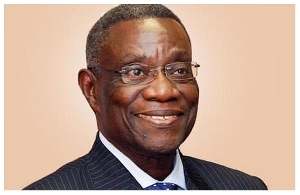Sara Maino, Deputy Director, Special Projects and Talents for Vogue Italia, visited BlueCrest College on 21st October.
Her mission was to see what the faculty and students at the School of Fashion and Design have for the world.
It was that simple. Nothing much to report than to say look out for a feature on the visit in Vogue magazine.
The visit included a brief meeting attended by Dev Varyani, the board chair of BlueCrest College himself, which immediately provided serious impetus and gravitas to the event.
Also present were Dr Anand Agrawal, Rector and Sujith Jayaprakash, Director of Outreach and Collaboration.
Sara Maino was in Accra to attend the Glitz awards when Sujith Jayaprakash “invited her to visit our campus”.
She on her part graciously promised to connect BlueCrest to Vogue’s Africa correspondent.
Clearly brand essence and dress code have a direct correlation; they impact each other in a negative or positive way.
That same week some female students reported that at the college’s town hall meeting, our distinguished rector had reported his disappointment at the sartorial finesse of the students in Ghana.
He had prevailed on them to improve this considerably and as quickly as possible.
“Our people need to be taught how to dress,” observed by mentor. “It is a language with rules. We need to burst the bubble of ignorance.”
We shall await the assessment of the seminal publication of Vogue, knowing fully well that as an institution of higher learning, “theory and practice cannot be divorced from each other,” as my mentor often says.
Teaching students in Ghana how to dress has been a personal battle, both in class and informally, at every institution where I have taught.
Interestingly even though these students come from several African countries, their attitude is invariably the same.
My battle in class is to ensure that mass communication students project the right image on air.
Even distinguishing “immoral from inappropriate” is a battle.
“All I am saying is that if you go broadcasting radio news in the studio or visit some people’s homes for a radio interview inappropriately dressed, and they photograph or video you for whatever reason during or after the interview, and place those photographs online, you will destroy your personal brand and the corporate brand you represent,” I find myself often repeating.
Students do carry the debate back to me several times at various platforms both in and outside the classroom which shows that they are highly interested in the matter.
For mass communication students, their concern is twofold: first if you are doing radio news no one can see you in the studio; and two, am I saying all these “celebrity” presenters on radio and TV are wrong?
The message does get home eventually but only close to the end of the semester when the students have scored me poorly for teaching what they do not understand.
In Richard E. Petty and John T. Cacioppo’s research on the Elaboration Likely Model, they tell us that most promotional messages appeal to an audience through one of two routes – the “central route” and the “peripheral route”.
The central route goes direct to the brain by employing reason and the direct benefits in products to convince us to buy them or use them.
The peripheral route appeals to our emotions, literally dancing around the issues to get to our brains.
“Most people cannot think,” my mentor will often charge. “This is documented in an at least 11 scientific studies.” He adds, “Thinking is hard work, they will rather hurt themselves than think.”
Thus, when the central route does not work, we can choose to use parody, satire, double entendre, pun and other approaches that mimic the seriousness of the situation to drive home the message.
Still, in a society where connecting the dots is a challenge, we can appropriate the words of Lebron James, the NBA superstar and say, “It’s hard being a Black teacher in Ghana.”
We await Vogue Magazine’s viewpoint.
Once you open yourself up to media and public scrutiny, whether you are hiding behind a radio microphone or not, you better lift up your game.
Feedback; ato@writersghana.com; www.writersghana.com; LinkedIn, Isaac Ato Mensah; Instagram, @atomenswriters; Twitter, @Atomens; Facebook, Writers and Shakespeares Ghana; Telegram, Isaac Ato Mensah; Quora, Isaac Ato Mensah; WhatsApp (+233) 020 022 0353.
Writers and Shakespeares Ghana Limited exist to be a moral and intellectual guide to the best practice of PR and integrated communications around the world, beginning with Ghana.
Opinions of Monday, 2 December 2019
Columnist: Isaac Ato Mensah















